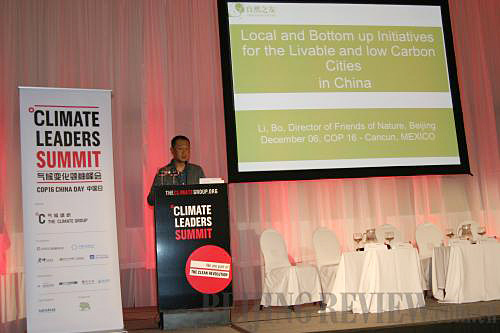|
 |
|
VOICE ON WORLD STAGE: Li Bo of Friends of Nature delivers a speech on December 6 at the China Day event on the sidelines of the UN Climate Change Conference in Cancun, Mexico (COURTESY OF FRIENDS OF NATURE) |
When dawn broke in Cancun, Mexico on December 11, several young Chinese at the two-week United Nations Climate Change Conference were still too excited to sleep. Some of them were sharing their experience at the conference, which concluded hours before, with friends back in China via the Internet.
These youths are working for environmental non-government organizations (NGOs) based in China. The UN conference is a platform for environmental NGOs to advocate their ideas and showcase their organization.
More than 10 Chinese environmental NGOs were present at the climate change conference in Cancun.
Cancun imprint
Representatives of Chinese environmental NGOs first attended the UN climate change conference in Bali, Indonesia in 2007. In 2009, 20 plus Chinese NGOs participated in the conference in Copenhagen.
This was the second time Dou Lili, the climate change program officer of Friends of Nature, one of the oldest environmental NGOs in China, has traveled abroad to participate in UN climate change conferences. Her first journey was to last year's conference in Copenhagen, Denmark.
Chinese NGOs were more active in Cancun than in Copenhagen, Dou told Beijing Review. "In Copenhagen, we mostly observed and learned from others, while in Cancun, we actively took action in order to make changes happen," she said.
During the Cancun conference, representatives of Chinese environmental NGOs met every morning, summarized the previous day's work and made arrangements for the new day.
Chinese NGOs, such as Global Environment Institute and Green Rivers, also set up exhibition booths and hosted side events. Green Rivers distributed pamphlets on how global warming has adversely affected glaciers, forest and grasslands on China's plateaus and the livelihood of local residents.
At the China Day side event, government officials and green entrepreneurs from around the world, as well as representatives of regional and international organizations, shared experiences, information and best practices on practical low-carbon strategies they had put in place.
The event was co-hosted by international NGO, The Climate Group, and several non-profit organizations in China such as the Alashan Society of Entrepreneurs and Ecology and Vanke Foundation.
In Cancun, Friends of Nature and other Chinese environmental NGOs communicated with NGOs from Europe, the United States, Brazil, South Africa and India, Dou said. Chinese and U.S. NGOs also announced a cooperative agreement on December 9.
Talking about how the Cancun experience will inspire the future work of Chinese environmental NGOs, Dou said, in future, they will better align local perspectives with international perspectives, and find better ways to match their projects in China with specific fields covered by the climate negotiations.
"In this way, we will be able to play a greater role on the international stage, speak more realistically, and do better jobs," she said.
Fast growth
Environmental NGOs active in advocating for policies and actions slowing climate change are a diversified group in China.
As of October 2008, 58.6 percent of 3,539 environmental NGOs were involved in energy conservation and emissions reduction in China, said the All-China Environmental Federation in a report.
The All-China Environmental Federation classifies environmental NGOs into four categories: government-sponsored organizations, grassroots organizations, branches of international organizations and student organizations.
China had 508 grassroots environmental NGOs in 2008, 300 more than in 2005. There were also 1,309 government-sponsored environmental NGOs, 1,382 school environment societies, 90 branches of international environment organizations, and nearly 250 environmental NGOs in Hong Kong, Macao and Taiwan.
| 